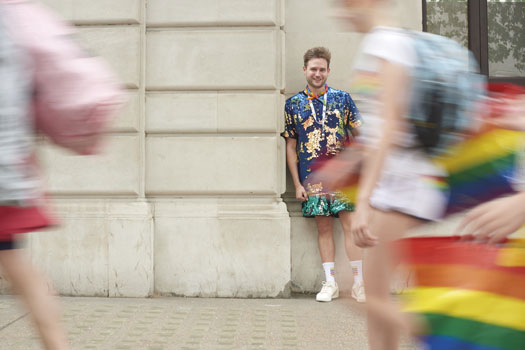Working Life: The RCGP at Pride


Profile – Dr Anthony James
Roles – GP trainee at the Royal Free Hospital, London; national medical director’s clinical fellow at NHS Digital; RCGP LGBT+ steering group member; lead north west London rep at the RCGP’s associate in training committee; health adviser at PinkNews; co-lead at TEDxNHS
Hours worked – 40 contracted and five to 10 in voluntary and additional roles
8.30am
The day has finally arrived – it’s Pride in London. More than a million people are taking to the streets for one of the biggest Pride celebrations in the world and a key date in the LGBT+ calendar.
9am
Before the parade, I reflect on how this is the first time the RCGP will be marching, and how we are the first medical royal college to join a Pride event.
When you imagine Pride, you might envisage fabulous drag queens or shirtless men with chiselled torsos.
In reality, though, Pride encourages people of all body types, beliefs and backgrounds to celebrate together.
Just like the attendees of Pride, there are all sorts of GPs and LGBT+ GPs, reflecting the diversity that makes primary care a fantastic place to work.
In the months leading up to the event, the college put great energy and enthusiasm into the planning, mainly led by a core team of GPs, trainees and staff from the new LGBT+ steering group.
But not everything has gone to plan.
A last-minute email says our specially designed #PrideRCGP T-shirts will not arrive in time. We all agree to don our best glad rags instead. From the sparklier side of my wardrobe, I conjure up a sequinned T-shirt and shorts. Crisis averted.
12pm
As I arrive at the RCGP’s head offices in Euston, the team has passed the rest of the preparation stage with flying colours. I’m thrilled the rainbow Pride flag is standing at the top of the building, and my route upstairs is punctuated by a sea of flags, banners and a whole lot of face paint. Around 70 other GPs, trainees and RCGP staff are on the march, so the atmosphere as we gather is electric.
2.30pm
Throughout the afternoon, I meet colleagues who reinforce why the college’s visibility at Pride is so meaningful. I talk to those who don’t feel a sense of community in the profession. Several aren’t comfortable to be ‘out’ at work, while others have experienced prejudice. Tackling these issues was partly why the LGBT+ steering group was established. Today means a lot to my LGBT+ colleagues.
3pm
It’s finally time to set off from the college for the main event. We have a wonderful float, balloons and placards, and yes, Taylor Swift and Aqua tunes may be featuring heavily. We’re towards the back of the parade, but that doesn’t deter the crowds, who welcome us all with cheers, waves and high-fives.
5pm
Pride in London has gained a reputation as an inclusive family event, and many of the biggest greetings come from children and young people. Whether they’re attending as members of the LGBT+ community, as part of an LGBT+ family or as allies, I find this one of the most important parts of Pride. It’s so moving to see the brighter future the next generations are shaping. As we reach Trafalgar Square, the crowd joins us in a rendition of YMCA. This scene is truly camp and fabulous, thanks in part to our resident construction worker Richard and his amazing RCGP body paint.
7pm
The parade has wrapped up, but the festivities don’t slow down. However, it’s still not uncommon to hear some people question the role of Pride in 2019. Hasn’t the LGBT+ community won its rights?
While we’ve made massive progress in the UK, homophobic and transphobic hate crimes have doubled since 2014, LGBT+ people experience significant health inequalities and the rights of the trans community are still under attack.
Homosexuality remains illegal in more than 70 countries, 11 of which retain the death penalty.
Pride, therefore, celebrates how far we’ve come. But being rooted in a protest, it also demands better for LGBT+ people at home and further afield.
I head off with colleagues and friends to continue celebrating, armed with the feeling that what we’ve done really matters. I’m energised to do it again at Manchester and Brighton later this year. And I’m proud.
Pulse July survey
Take our July 2025 survey to potentially win £1.000 worth of tokens












